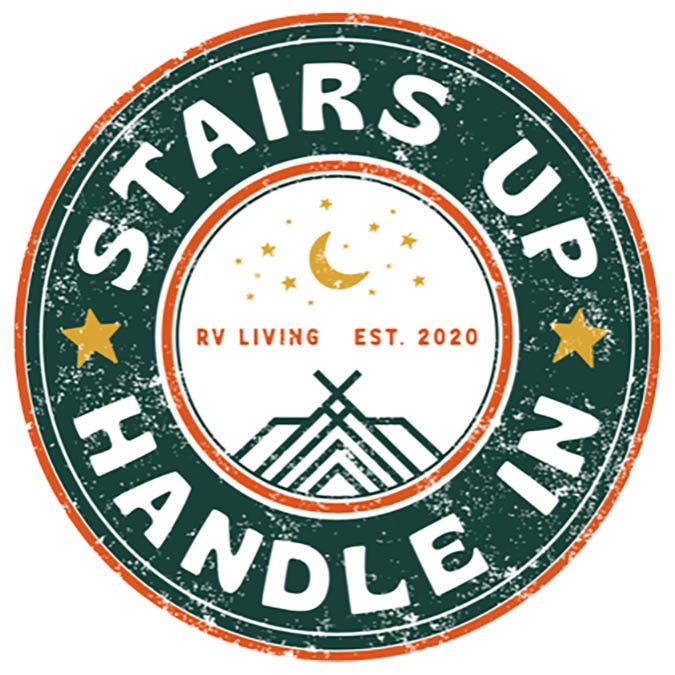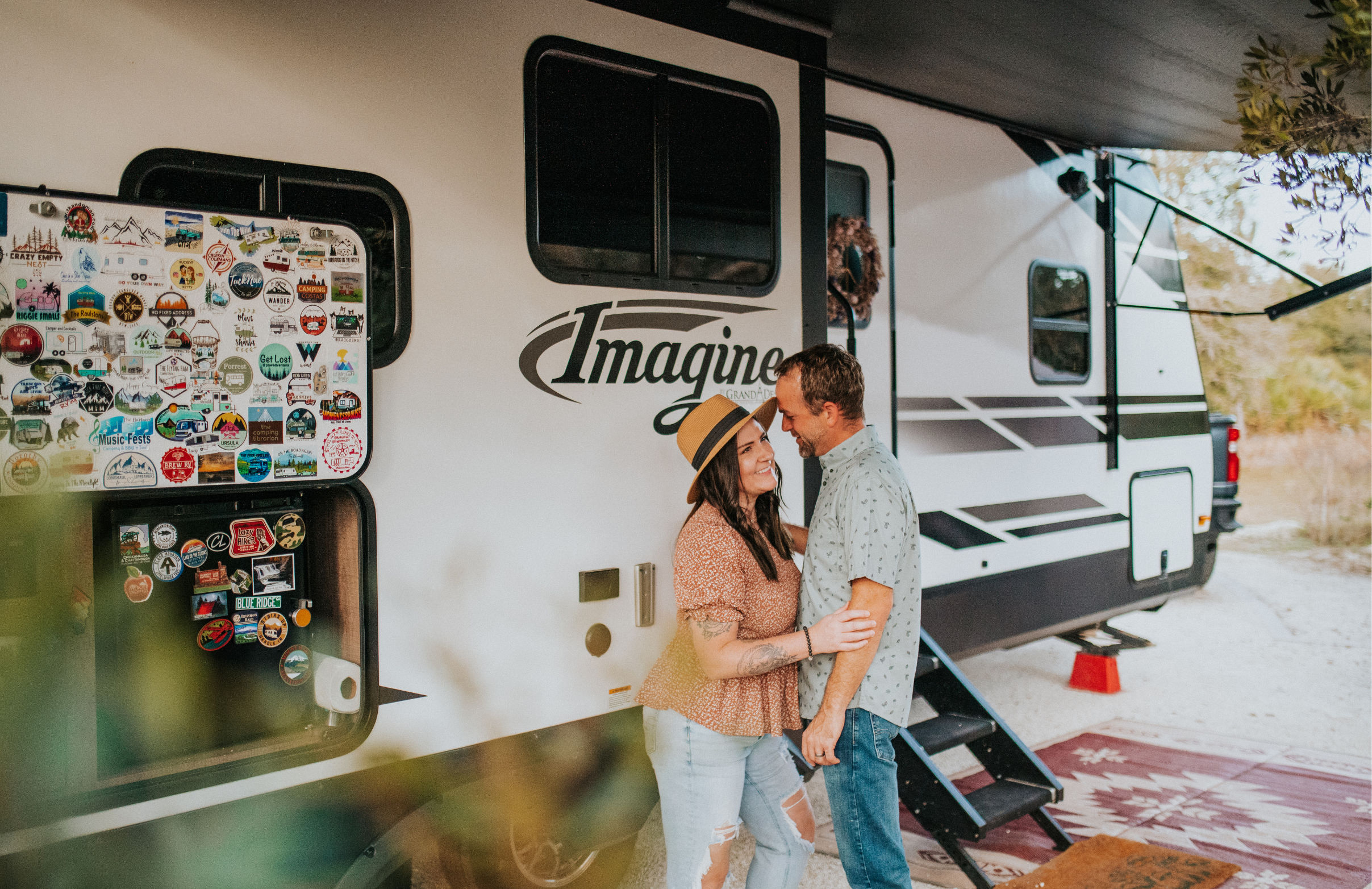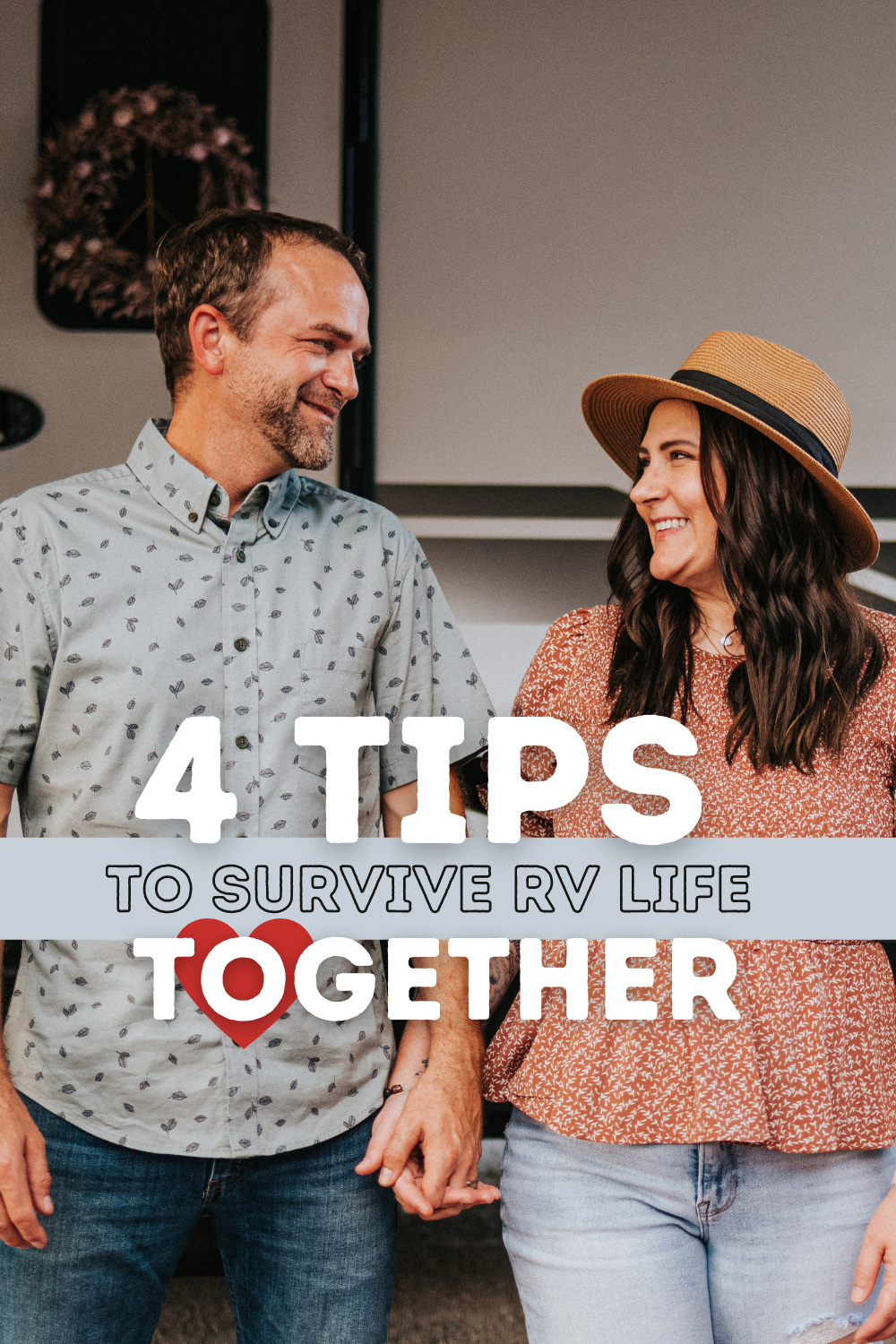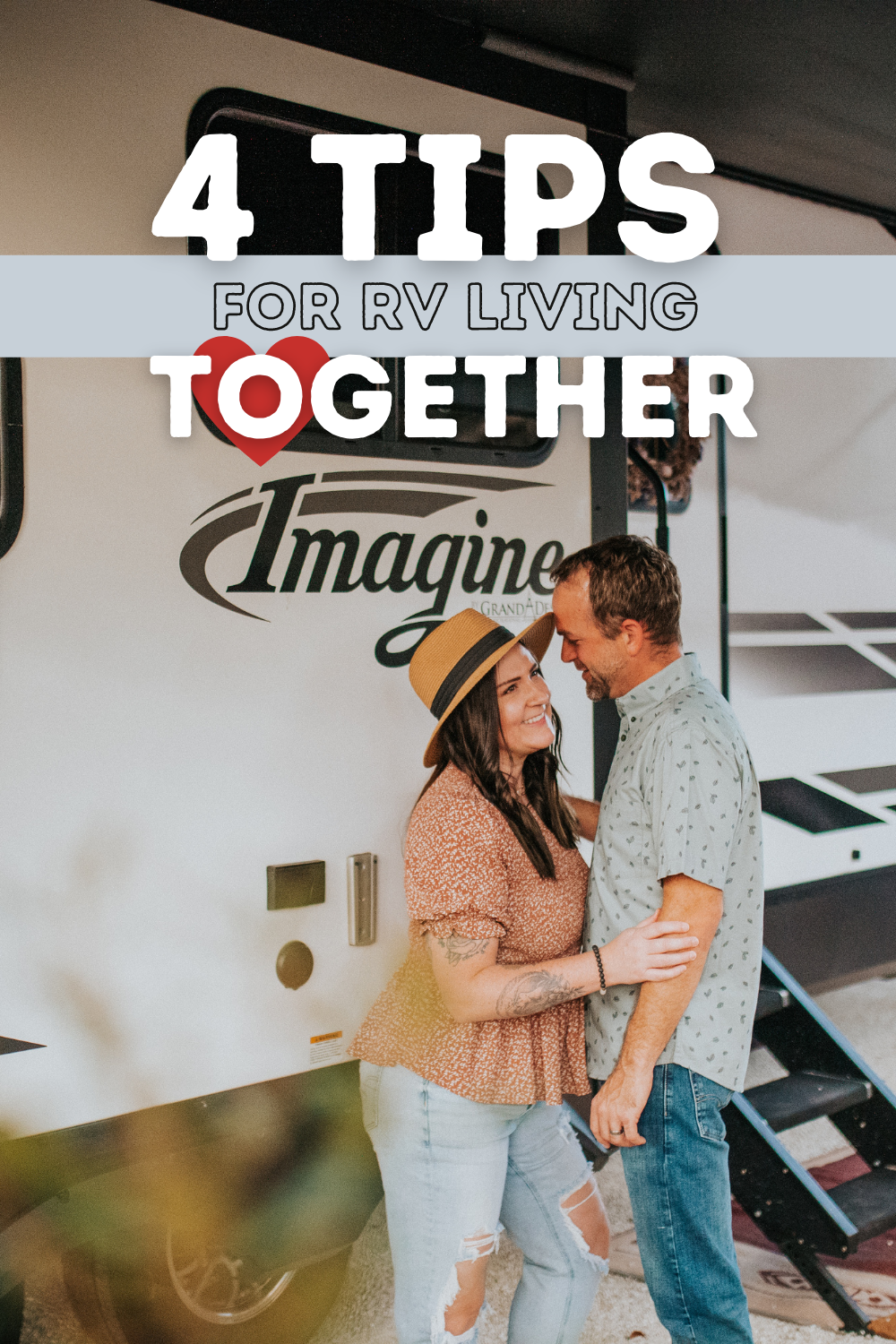4 Essential Steps to Prepare for Full-Time RV Living Together
Photo by Oak and Iron Photography
Recently updated - January 2025
Preparing for Full-Time RV Life
We’ve been married for over 20 years, and have been living in our RV full-time since July 2020. Before becoming full-time RVers, we raised 3 children and worked traditional 9-5 jobs while building ‘the American dream’.
In the last 3+ years, we have lived both as stationary RVers and as nomadic travelers, exploring the U.S. along with our 2 dogs.
Along the way, we’ve learned how to navigate our new normal. We have adapted the foundation of our relationship to acclimate to an entirely different way of living, and in much smaller surroundings.
We recognize that there were opportunities for us to have better prepared our relationship for RV life, while celebrating unexpected revelations and growth that was inspired by our new way of living.
Together, we’ve developed what we believe to be the 4 essential steps to encourage success, and to help you survive and THRIVE in the RV lifestyle, together.
#1 Align On The Expectations You Have For The RV Lifestyle
Photo by Oak and Iron Photography
For most people, full-time RV living is likely a change from their normal life. And, it’s also likely to involve several months or even years of planning.
The earlier in the planning process that you have the conversation around your expectations, the better your outcome will be, but like we said – it is never too late!
Beyond the Pros and Cons of RV Living: Where You Need to be Aligned
Here are the key areas where you will want to align on expectations:
What are you looking to get out of this lifestyle?
What will your lifestyle look like?
What differences can I expect from living in an RV versus a house?
What are you looking to get out of this lifestyle?
Above all, what is your North Star of RV living? Are you making the leap because it’s a bucket list item that you want to fulfill, or are you hoping to gain financial independence from downsizing your financial footprint?
There are many reasons why couples decide to explore full-time RV living, and they vary significantly.
Without clear guidance, your actions could completely derail your ability to meet these goals.
What will your lifestyle look like? Will you be stationary, or traveling? If you are planning to travel, how often will you change locations?
To travel, or not to travel, that is the question. However, there is no wrong answer … as long as it’s mutually decided.
Both styles of full-time RV living can be exciting and both have their pros and cons.
They are also so wildly different, that it would be similar to deciding to relocate your family to another state without asking your partner.
What differences can I expect from living in an RV versus a house?
Aside from the obvious answer that your new home will roll …
All jokes aside, transitioning to full-time RV living can disrupt what you have created as your “household norms”.
For example, when we became full-time RVers, it allowed Eric the opportunity to retire. We had to adjust to not only living together in an RV, but also to a new schedule, more time together, and an interruption in our household norms. Who does the dishes? Who starts the coffee? Is that coffee pot REALLY clean after they washed it?
And even if your move to full-time RV living comes without changes to work or schedules, it will likely still surface pet peeves that you may not have previously noticed or simply overlooked in a larger house.
Your surroundings are much smaller, and the spots of dirt may appear much larger.
A simple conversation to align on the changes you may expect in your household norms and even “what does clean mean to you?”, could save future blow-ups that would otherwise likely be much to do about nothing.
Photo by Oak and Iron Photography
#2 Build Routines to Help Plan for Full-Time RV Living
RV life can be hectic.
Even if you are living in a stationary site, you can still tend to lose some sense of stability that can come from living in a traditional house. Full-time RV living opens the doors to adventure, while also exposing you to new challenges and unexpected obstacles.
Establishing foundational routines can help you to be better prepared to handle such moments of instability.
(And no, we aren’t talking about stabilizing jacks).
Preparing for full-time RV living through routines
Here are some aspects of routines that you may want to consider building:
What type of schedule should you maintain in an RV?
What is your day-to-day life like when full-time RV living?
How will you feel fulfilled?
What type of schedule should you maintain in an RV?
This is especially important if one, or both of you will be working, or if you have pets, children, or other varied needs.
The difference between a schedule in a house and a schedule in an RV is that you can more easily be affected by things like inclement weather, travel days, noisy neighbors, reduced resources, or mechanical problems.
Consider how each of these could affect things like your work meetings or a homeschooling schedule, and create a backup plan.
Most importantly, maintain transparency into changes to the schedule so you can best accommodate your partner’s needs and avoid those last minute changes that contribute to a hectic environment.
What is your day-to-day life like when you are full-time RV living?
Another part of your foundational routine should be built around your personal wants and needs.
If you are moving into an RV expecting that your spouse will want to sit fireside, making s’mores with you every night, you could be left disappointed. What makes you feel fulfilled today, and how will that change when you live in an RV?
Us, we are very split in that Eric loves to be outdoors and I prefer to be indoors.
When we lived in our house, this wasn’t an issue because we lived a lifestyle that just had us inside most nights. Now that we live in campgrounds, Eric prefers to be outside by the campfire.
This brings us to the next point:
How will you feel fulfilled?
If Eric waited around for me to come to sit by the fire with him, he would rarely enjoy the environment that he loves most.
On the other hand, I can find satisfaction in catching up with my favorite show (and possibly writing a blog) while he enjoys the outdoors.
And don’t worry, we do plenty of both together too, and it makes us enjoy those moments that much more!
Consider how your likes and dislikes line up, and how you imagine spending time together as RVers. Are there activities that you can always do on your own to help you feel fulfilled?
Photo by Oak and Iron Photography
#3 Recognize and Praise Growth in Your Partner
This may seem obvious, and you might question how this is any different when you’re full-time RV living versus a traditional house.
The answer is that when you live in an RV, you are constantly faced with new, or challenging situations. I am not trying to scare you into thinking that RV living is scary or problematic, but it is very different.
From planning a travel route to packing up and moving your home, to the unexpected flat tire or campsite filled with bugs … you will most likely face situations that you had not dealt with, or at least not as frequently dealt with, in the past.
Preparing for full-time RV living through routines
What are some of the ways you can strengthen the bond with your partner?
Identify the strengths that each of you will bring to the RV lifestyle
Celebrate personal growth experienced through full-time RV living
Prepare for moments without strength
Identifying the strengths that each of you will bring to the RV lifestyle
Recognizing the strengths (and weaknesses, too!) that each of you will bring to the RV lifestyle will help you to align your mission together.
There are more intricate tasks that may be outside of your normal routine, and determining how you can divide these responsibilities in advance will create a sense of ownership and synergy.
One simple example of this is planning who will own what tasks on travel days.
For us, Eric cares for the outdoor duties like emptying the tanks and dialing in the hitch, while I organize and pack away everything inside.
Another example would be when Eric and I tackled a couple of larger projects in the RV recently. I used my skill set to plan and design the project, while Eric did troubleshooting to determine how we would reroute electricity to make our project possible.
These are just two personal examples, but in each situation the outcome would have been impacted significantly without our individual contributions. Knowing where you will add the most value to your new life together can help you align on key tasks and expectations in advance.
Celebrate personal growth experienced through full-time RV living
Wait, are you saying I will still experience personal growth in tiny living? Yes, and the answer is … quite a lot.
But what you do with it, is more important.
One of the most impactful ways that you can strengthen the bond with your partner is by recognizing and praising moments of personal growth. This is especially important when you are faced with new or stressful challenges.
For example, when we experienced a tire blowout on the side of I-95, the first thing that we did was go into problem-solving mode. Eric immediately began sourcing tools and assessing the damage, while I began researching tire shops nearby and keeping the dogs calm inside the truck.
We used our skills to divide and conquer a situation that we had not previously been through together.
But we didn’t stop there.
Once we had the tire replaced and we were safely back on the road, we took time to praise each other for how we contributed to the overall outcome.
We recognized that without Eric’s skills – I would have been on the side of the road still. Without my skills, Eric would not have been able to apply a temporary fix to get us to the tire shop.
Simply put, positive behavior that is positively recognized, is repeated. Praising your partner’s personal growth encourages a healthy response to learning and trying new things.
Prepare for moments without strength
Will it happen? Maybe.
Regardless of how far in advance you prepare, how you divvy up tasks or how enthusiastically you praise each other – there may come a time when you are faced with such significant challenges that strength or no strength, you just aren’t equipped to handle it.
You’re scaring me, Jen.
Here’s the thing. The stronger you build your foundation as a couple, the more grace you’ll be able to give to these challenging situations.
For example, we both were down and out with an illness and had zero strength left in us. It took everything that we had to care for each other until we got through it.
We relied on the foundation that we built. We had clear insight into the tasks that each of us had been doing so we could chip in to help out. We recognized each other for pulling ourselves together to care each other. We essentially dug into each of these principles and applied them together to carry us forward.
They always say to have a back-up plan, and in the RV life – that sits on top of your foundation so build it strong.
Photo by Oak and Iron Photography
#4 Conflict Resolution - Bigger in Tiny Living
When all else fails, at least resolve it.
Full-time RV living leaves you very little room to hide anything, and only amplifies issues when they arise. Over the past year, this is one of the areas where we saw the most change in how we handled conflict resolution while living in an RV versus in a traditional house.
The time is right to resolve conflict, especially in the RV lifestyle
What are the key aspects to help resolve conflict some of the ways you can strengthen the bond with your partner?
Create transparency to reduce conflict
Respect the changing environment of RV living
But always speak up
Create transparency to reduce conflict
It might surprise you that even when you live in a tiny footprint, it still may not be apparent when your partner is struggling or upset.
It makes it even more important to surface concerns as they arise, creating transparency into what challenges you are facing and what you need from your partner.
Respect the changing environment of RV living
It is incredibly important to address conflict in a timely manner to avoid escalation. However, with all of the new and different tasks that you will experience as part of RV living, you also need to recognize the right time to discuss issues.
For example, we’d avoid teardown time on a travel day or when you are in the middle of a tense project.
A good compromise is to come to an understanding in advance that you will pause conflict during these tense situations, or during activities that directly impact your safety (like hitching up the RV).
Instead, a great best practice is to create regular opportunities to download and discuss things together.
For us, we created a routine where we take a walk alone together every other night. No dogs and no distractions, just the two of us. It gives us the forum to share what’s on our minds and creates an environment of active listening.
But always speak up
On the other hand, we’ve mentioned several times how many new tasks you will be involved in when it comes to full-time RV living.
It is imperative that you maintain focus to ensure you are operating in a safe environment and encourage your partner to speak up if they see something amiss.
For example, while setting up I recognized that Eric was about to do one step in front of another when they should have been flipped. I mentioned it to him and at first, he didn’t recognize the issue.
Instead of ignoring it and assuming he knew what was happening, I asked Eric to pause and run through it with me.
Pausing the progress of work helped ensure that I didn’t let him make a mistake if that is where he was headed, and gave us the time to align on what we were seeing and how to progress.
We share this example because in these moments is usually when tensions are already high and it can be easy to dismiss your partner, or confuse the second-look as an “attack”.
You can create an environment of positive intent by acknowledging together in advance that these types of reminders come from a place of safety and encourage each other to always speak up.
Don’t make the same mistakes we did
After 3 years of RV life on the road, we have put our personal lessons into action!
Introducing, our Survive and Thrive RV Life Workshop, with 4 Date-Night Worthy Workshops to guide you from aligning on RV life goals to learning how to communicate and resolve conflicts together. With over 30+ pages of insights and printable activities – we break down everything you need, to build a strong foundation.
YES! You CAN Survive and Thrive RV Life Together
Putting our four essential tips into action will help you prepare your relationship for the lifestyle change that comes with RV living. It absolutely is possible to survive the RV life together, and by cultivating a healthy environment to promote growth and understanding – your relationship can truly THRIVE.
Thanks for being here,
Jen + Eric
WE’D LOVE TO HEAR FROM YOU
Share your tips in our comments below!
Pin 4 Essential Steps to Survive + Thrive RV Life Together for later
MORE FROM OUR RV COMMUNITY
Annie, from @homemade _ comfort _ cb shares: “Be clear with your desires, expectations and feelings. This helps avoid misunderstandings and arguments. Take an opportunity to give each other space if needed during conflicts, or arguments.”
Susan shares that she and her husband take pre-planned breaks away to enjoy their personal hobbies. She enjoys lounging in the hammock, and bird-watching while her husband enjoys fishing. This time apart has helped keep their relationship happy and healthy while they’ve been on the road for 4 years.
Haley from @walk _ on _ adventure shares “Trust your partner’s area of expertise! Let each other do your thing. Also … invest in AirPods so you can have your own brain space, even if you’re close together.”








We’re Jen + Eric
After falling in love with everywhere we went, we changed our lives and became full-time RVers.
In the past 3 years, we’ve visited over 20 states, remodeled our first RV, hiked miles of trails, and proved that minimalism is in fact
NOT a pre-requisite for RV living.
Stick around, because we’re sharing everything
from how to get started, our learned experiences,
and most important …
how to make RV life a little ✨ EXTRA ✨